Charmayne, a free knitting pattern from Knitty.com. Free knitting pattern for a stockinette and lace shawl with optional beads.
INTRODUCTION
Charmayne
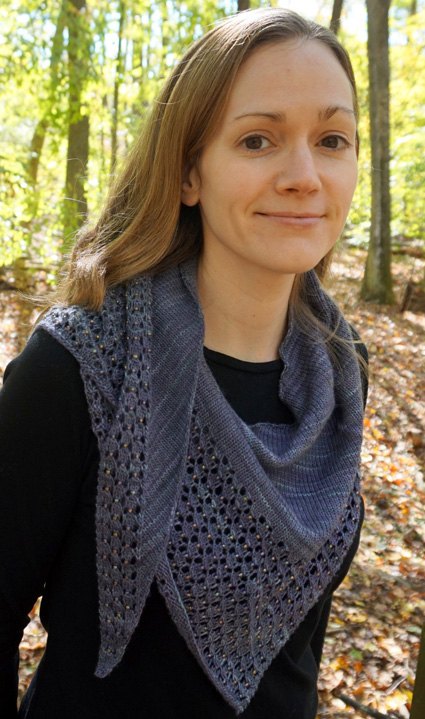 by Emily Wood
by Emily Wood
![]()
Along with many other people, I have fallen in love with asymmetrical triangular shawls! They are easy to make and flattering to wear. I love that they make it easy to use up all the yarn in a skein, so they are perfect for those beautiful single skeins we knitters seem to collect in our stashes at an alarming rate. And because the size of the shawl continues to change as the pattern goes along, the project stays fresh and interesting until the bind off.
The Charmayne Shawl, like its fellow asymmetrical shawls, starts with a few stitches and grows toward the far side. It has a stockinette body with a lacy border running along the bottom edge and finishes with another wide border of the lace pattern along the final edge. This simple lace pattern reminds me of diamonds, butterflies, and jewels, depending on my mood, and it looks lovely in a variety of colors and yarn weights.
Instructions for the shawl come in two sizes. The smaller size has a narrower lace border along the sides and includes beads for some additional pizzaz. (For a smaller shawl without beads, replace each “place bead” instruction with a purl stitch.)
The larger size, knit with sport-weight yarn, has a wider lace border along the bottom edge as well as additional repeats of the lace pattern along the final edge to create a slightly wider and deeper shawl with bolder lace.
 model: Emily Wood
model: Emily Wood
 photos: Daniel Wood
photos: Daniel Wood
SIZE
S[L]
FINISHED MEASUREMENTS
Width: 58[60] inches/ 147[152.5] cm
Depth: 16[21] inches/ 40.5[53] cm
MATERIALS
![]() Small blue beaded sample shown in:
Small blue beaded sample shown in:
Manos del Uruguay Fino [70% merino, 30% silk; 490 yd/450 m per 100g skein]; color: Inkwell; 1 skein
![]() Large green sample shown in:
Large green sample shown in:
Wollmeise Twin [80% superwash merino, 20% nylon; 510 yd/466 m per 150g skein]; color: Löwenzahn; 1 skein
Recommended needle size
[always use a needle size that gives you the gauge listed below - every knitter's gauge is unique]
![]() 1 US # 4[5] / 3.5[3.75] mm circular needle, 24 inch/60cm or longer
1 US # 4[5] / 3.5[3.75] mm circular needle, 24 inch/60cm or longer
Notions
![]() stitch marker
stitch marker
![]() yarn needle
yarn needle
![]() 50g (approximately 660) 6/0 seed beads (optional)
50g (approximately 660) 6/0 seed beads (optional)
![]() small crochet hook for placing beads (as required)
small crochet hook for placing beads (as required)
![]() blocking mats, wires and pins (as required)
blocking mats, wires and pins (as required)
GAUGE
24 sts/38 rows = 4 inches/10 cm in stockinette stitch with Manos del Uruguay Fino on US #4/3.5mm needles
22 sts/32 rows = 4 inches/10 cm in stockinette stitch with Wollmeise Twin on US #5/3.75mm needles
22 sts/34 rows = 4 inches/10 cm in lace pattern with Manos del Uruguay Fino on US #4/3.5mm needles
18 sts/32 rows = 4 inches/10 cm in lace pattern with Wollemise Twin on US #5/3.75mm needles
PATTERN NOTES
[Knitty's list of standard abbreviations and techniques can be found here.]
The length of the shawl can easily be adjusted by increasing or decreasing the number of rows worked. You can begin the End Rows at any point when you have a multiple of 6 plus an additional 5 (e.g. 17, 23, 29, …. ). If using beads, changing the size of the shawl will change the number of beads needed.
Once the pattern has been established – by Row 24 for the small version, Row 38 for the Large version – place a stitch marker after the k2tog to keep track of the edge between the stockinette and the lace.
Techniques:
- Place bead: Using a crochet hook, lift the stitch off the LH needle and slide the bead onto the stitch. Return the stitch to the LH needle and then purl it.
- Sk2p: Slip the next stitch knitwise, k2tog, and pass thes lipped stitch over the stitch just worked. 2 sts decreased.
DIRECTIONS
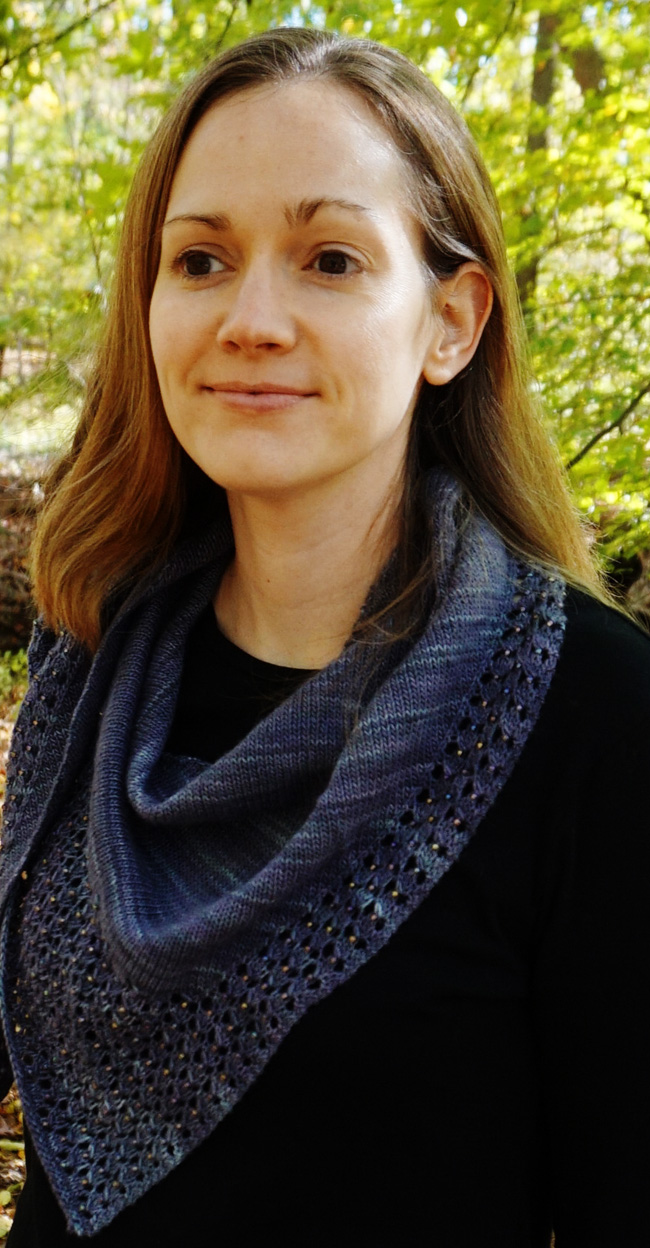
SMALL (BLUE) SHAWL WITH BEADS
CO 2 sts.
Row 1 [WS]: Knit.
Row 2 [RS]: Kfb, k1. 3 sts
Row 3: K2, kfb. 4 sts
Row 4: Kfb, k2tog, k1.
Row 5: K3, kfb. 5 sts
Row 6: Kfb, k2tog, k2.
Row 7: K2, p2, kfb. 6 sts
Row 8: Kfb, k2tog, k3.
Row 9: K2, p3, kfb. 7 sts
Row 10: Kfb, k2tog, k4.
Row 11: K2, p4, kfb. 8 sts
Row 12: Kfb, k2tog, yo, sk2p, yo, k2.
Row 13: K2, p1, place bead, p3, kfb. 9 sts
Row 14: Kfb, k2tog, k6.
Row 15: K2, p to last st, kfb. 10 sts
Row 16: Kfb, k2tog, k2, yo, sk2p, yo, k2.
Row 17: K2, p1, place bead, p to last st, kfb. 1 st increased.
Row 18: Kfb, k2tog, yo, sk2p, yo, k5.
Row 19: K2, p4, place bead, p to last st, kfb. 1 st increased.
Row 20: Kfb, k2tog, k4, yo, sk2p, yo, k2.
Row 21: Same as Row 17.
Row 22: Kfb, k2tog, k2, yo, sk2p, yo, k5.
Row 23: Same as Row 19.
Row 24: Kfb, k2tog, pm, yo, sk2p, yo, k3, yo, sk2p, yo, k2.
Row 25: K2, p1, place bead, p5, place bead, p to last st, kfb. 15 sts
Row 26: Kfb, k1, k2tog, sm, k3, yo, sk2p, yo, k5.
Row 27: K2, p4, place bead, p to last st, kfb. 16 sts
16 sts total; 11 sts after the marker.
Main Pattern
Row 1 [RS]: Kfb, k to 2 sts before marker, k2tog, sm, yo, sk2p, yo, k3, yo, sk2p, yo, k2.
Row 2: K2, p1, place bead, p5, place bead, p to last st, kfb. 1 st increased.
Row 3: Kfb, k to 2 sts before marker, k2tog, sm, k3, yo, sk2p, yo, k5.
Row 4: K2, p4, place bead, p to last st, kfb. 1 st increased.
Repeat Rows 1-4 of the Main Pattern 57 times, then work Rows 1-2 once more. 131 sts.
On the next row, remove the st marker.
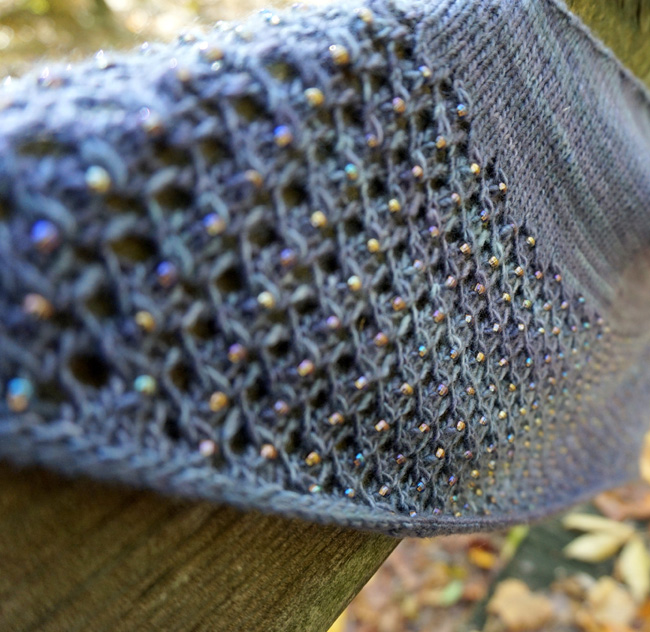
Lace Edge
Row 1 [RS]: Kfb, k2tog, (yo, sk2p, yo, k3) to last 2 sts, k2.
Row 2 [WS]: K2, p4, (place bead, p5) to last 5 sts, place bead, p3, kfb. 1 st increased.
Row 3: Kfb, k2tog, k4, (yo, sk2p, yo, k3) to last 5 sts, yo, sk2p, yo, k2.
Row 4: K2, p1, (place bead, p5), to last 9 sts, place bead, p7, kfb. 1 st increased.
Row 5: Kfb, k2tog, k2, (yo, sk2p, yo, k3) to last 2 sts, k2.
Row 6: K2, p4, (place bead, p5) to last st, kfb. 1 st increased.
Row 7: Kfb, k2tog, (yo, sk2p, yo, k3) to last 5 sts, yo, sk2p, yo, k2.
Row 8: K2, p1, (place bead, p5) to last 5 sts, place bead, p3, kfb. 1 st increased.
Row 9: Kfb, k2tog, k4, (yo, sk2p, yo, k3) to last 2 sts, k2.
Row 10: K2, p4, (place bead, p5) to last 3 sts, p2, kfb. 1 st increased.
Row 11: Kfb, k2tog, k2, (yo, sk2p, yo, k3) to last 5 sts, yo, sk2p, yo, k2.
Row 12: K2, p1, (place bead, p5) to last st, kfb. 1 st increased.
Repeat Rows 1-12 twice more, then repeat Rows 1-4 once. 151 sts
Next Row: Kfb, k2tog, k to end.
Next row: K to last st, kfb. 152 sts
Bind off all sts.
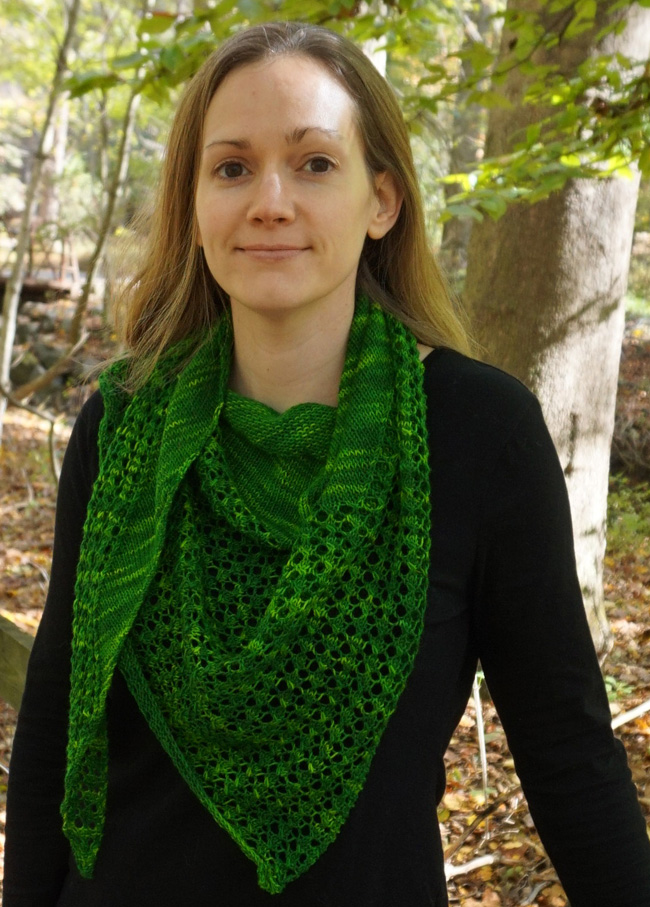
LARGE (GREEN) SHAWL
CO 2 sts.
Row 1 [WS]: Knit.
Row 2 [RS]: Kfb, k1. 3 sts
Row 3: K2, kfb. 4 sts
Row 4: Kfb, k2tog, k1.
Row 5: K3, kfb. 5 sts
Row 6: Kfb, k2tog, k2.
Row 7: K2, p2, kfb. 6 sts
Row 8: Kfb, k2tog, k3.
Row 9 and all WS rows: K2, p to last st, kfb. 1 st increased.
Row 10: Kfb, k2tog, k4.
Row 12: Kfb, k2tog, yo, sk2p, yo, k2.
Row 14: Kfb, k2tog, k6.
Row 16: Kfb, k2tog, k2, yo, sk2p, yo, k2.
Row 18: Kfb, k2tog, yo, sk2p, yo, k5.
Row 20: Kfb, k2tog, k4, yo, sk2p, yo, k2.
Row 22: Kfb, k2tog, k2, yo, sk2p, yo, k5.
Row 24: Kfb, k2tog, yo, sk2p, yo, k3, yo, sk2p, yo, k2.
Row 26: Kfb, k2tog, k4, yo, sk2p, yo, k5.
Row 28: Kfb, k2tog, k2, yo, sk2p, yo, k3, yo, sk2p, yo, k2.
Row 30: Kfb, k2tog, (yo, sk2p, yo, k3) twice, k2.
Row 32: Kfb, k2tog, k1, (k3, yo, sk2p, yo) twice, k2.
Row 34: Kfb, k2tog, k2, (yo, sk2p, yo, k3) twice, k2.
Row 36: Kfb, k2tog, (yo, sk2p, yo, k3) twice, yo, sk2p, yo, k2.
Row 38: Kfb, k1, k2tog, pm, (k3, yo, sk2p, yo) twice, k5.
Row 39: K2, p to last st, kfb. 22 sts, 17 sts after marker.
Main Pattern
Row 1 [RS]: Kfb, k to 2 sts before marker, k2tog, sm, (yo, sk2p, yo, k3) twice, yo, sk2p, yo, k2.
Row 2: K2, p to last st, kfb. 1 st increased.
Row 3: Kfb, k to 2 sts before marker, k2tog, sm, (k3, yo, sk2p, yo) twice, k5.
Row 4: Same as Row 2.
Work Rows 1-4 of the Main Pattern 45 times, then work Rows 1-2 once more. 113 sts.
On the next row, remove the st marker.
Lace Edge
Row 1 [RS]: Kfb, k2tog, (yo, sk2p, yo, k3) to last 2 sts, k2.
Row 2 and all WS rows: K2, p to last st, kfb. 1 st increased.
Row 3: Kfb, k2tog, k4, (yo, sk2p, yo, k3) to last 5 sts, yo, sk2p, yo, k2.
Row 5: Kfb, k2tog, k2, (yo, sk2p, yo, k3) to last 2 sts, k2.
Row 7: Kfb, k2tog, (yo, sk2p, yo, k3) to last 5 sts, yo, sk2p, yo, k2.
Row 9: Kfb, k2tog, k4, (yo, sk2p, yo, k3) to last 2 sts, k2.
Row 11: Kfb, k2tog, k2, (yo, sk2p, yo, k3) to last 5 sts, yo, sk2p, yo, k2.
Row 12: K2, p to last st, kfb. 1 st increased.
Repeat Rows 1-12 six times more. 155 sts
Next row: Kfb, k2tog, k to end.
Next row: K to last st, kfb. 156 sts
Bind off all sts.
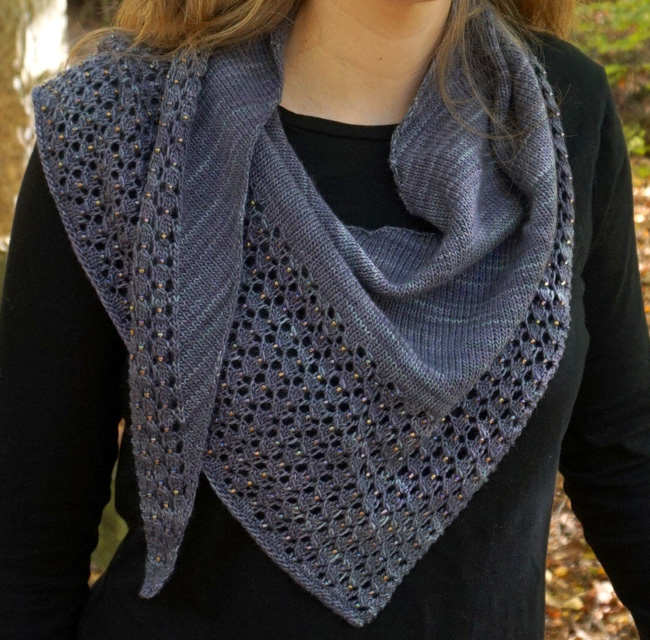
FINISHING
Weave in ends. Block the shawl using wires or pins.
ABOUT THE DESIGNER
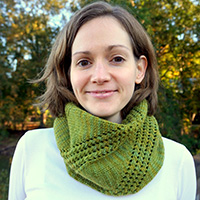 Emily lives with her family in Maryland. In addition to designing knitting patterns, she enjoys baking, reading novels, and amateur attempts at gardening.
Emily lives with her family in Maryland. In addition to designing knitting patterns, she enjoys baking, reading novels, and amateur attempts at gardening.
You can find her on Ravelry.
Pattern & images © 2018 Emily Wood